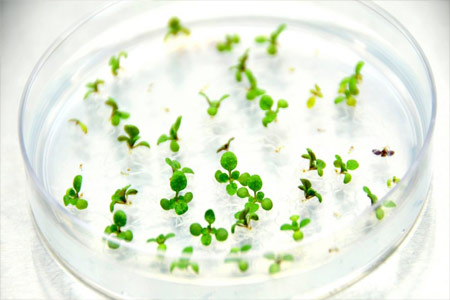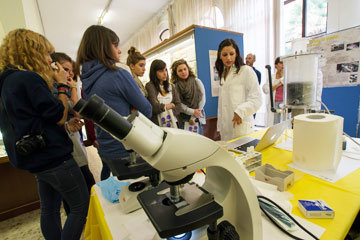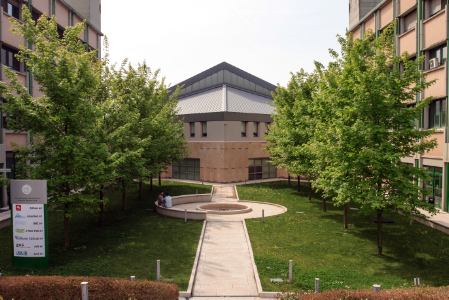- Fundamentals of classical genetics. Mendelian inheritance and atypical inheritance patterns: Mitocondrial inheritance, reduced penetrance, varable expressivity; digenic and triallelic inheritance, incomplete dominance, etc. Mosaicism. X chromosome inactivation.
- Molecular genetics in medicine. Gene and chromosomal mutations, mutation nomenclature. Mutagenesis and DNA repair. Molecular pathology of the gene: biological relevance and effect on the phenotype of mutations, role and action of mutations on genetic diseases, methods for mutation classification as disease-causing. Gain and loss of function mutations, dominance and recessiveness. Genotype-phenotype correlation.
- Diseases due to expansion of unstable repeat sequences (dynamic mutations). Unstable repeat expansion, premutation and full mutation, Sherman's paradox, anticipation, molecular analysis of repeat expansion.
- Cytogenetics: human chomosomes, normal karyotype, parent-of-origin effects, chromosomal polymorphisms and CNV. Imprinting and diseases due to genomic imprinting defect.
- Medical cytogenetics. Chromosomal abnormalities, numerical and structural. Chromosomic syndromes and Genome disorders. Uniparental disomy. Uniparental diploidy: hydatiform moles and ovarian teratomas.
- Bases of human genetics. Human genome organization, gene order on human chromosomes. Structure of eukaryotic genes. Repetitive DNA. DNA polymorphisms: RFLP, SNP, VNTR, minisatellites, microsatellites. Genetic markers, physical and genetic maps. Linkage Disequilibrium.
- Mendelian disease gene identification. Positional and functional cloning. Linkage analysis, human gene mapping, sequencing. Mutation identification.
- Medical genetics. Genetic and hereditary diseases. Examples of single-gene diseases. Preparation and interpretation of pedigrees. Modifier genes and complexity in single-gene disorders. Heteroplasmy and mitochondrial diseases.
- Methods of nucleic acid molecular analysis. PCR, real-time-PCR, electrophoresis, Sanger sequencing, hybridization, reverse dot blot, oligonucleotide ligation assay (OLA). Molecular diagnosis of genetic diseases, direct and indirect mutation analysis, diagnosis by linkage analysis.
- Methods of chromosome analysis. Banding methods, karyotype analysis. Fluorescence in Situ hybridization (FISH), FISH painting, SKY-FISH. Array CGH.
- Genetic testing. Diagnostic, presymptomatic, susceptibility, heterozygote identification, and pharmacogenetic tests. Applications and quality controls of genetic testing. Determination of genetic risks. Bayesian analysis. Consanguinity. Pre and post-natal diagnosis, population genetic screening, neonatal screening. Individual identification, paternity testing. Total and partial chimerism after bone marrow transplantation.
- Genetic variation in individuals and populations. Mutation and polymorphism. The Hardy-Weinberg law, allele and genotype frequency calculation.
- The inheritance of multifactorial traits. Genetics of common disorders with complex inheritance, genetic and environmental factors, qualitative and quantitative traits, genetic predisposition to common diseases.
- Identification of genetic factors in complex diseases. Segregation analysis. Mapping of complex traits. Familial and twin studies, Allelic Identity by State (IBS) or by Descendant (IBD). Parametric and Non-Parametric Linkage. Linkage and association analyses. Candidate gene studies. Transmission Disequilibrium Test (TDT). SNP, haplotype and genome wide association studies (GWAS).
- From human genome project to HapMap, 1000 Genome Project, Biological Encode Project , HGV project
- Pharmacogenetics. Individual variation of drug response. Genes and polymorphisms of drug metabolism and mechanism of drug action. Molecular diagnostics of pharmacogenetic traits.
- Cancer genetics. Cancer as genetic, somatic and multifactorial disease, hereditary and sporadic cancers, Two-Hits model. Classification and characterization of cancer genes (oncogenes, gatekeeper and caretaker tumor soppressor genes). Loss of heterozygosity (LOH), microsatellite instability (MIN).
REFERENCE TEXTBOOKS:
- R.L. Nussbaum, R.R. McInnes, H.F. Willard. Thompson & Thompson Genetics in Medicine. 7th ed. Saunders Elsevier 2007 (English language).
- Andrew Read and Dian Donnai. Genetica Clinica. I ed. Zanichelli 2007 (Italian language) or the new edition: “Andrew Read and Dian Donnai. New Clinical Genetics. 2nd ed. Scion Publishing Ltd. 2010” (English language).
- G. Neri e M. Genuardi. Genetica Umana e Medica. II Ed. Elsevier Masson 2010 (Italian language).
- To deepen the proposed topics:
Tom Strachan and Andrew Read. Human Molecular Genetics. 4th ed. Garland Science - Taylor and Francis Group, 2010 (English language).
Possible updatings or communications will be available during the course on the webpage dedicated to this course at “e-learning portal of University of Verona”.







